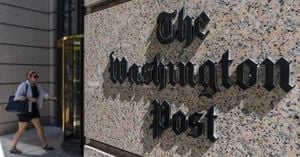Coffee Holding Co., Inc., a long-established player in the U.S. coffee industry, delivered its third quarter results for 2025 with a dramatic blend of robust sales growth and notable financial headwinds. The Staten Island-based company, listed on Nasdaq under the ticker JVA, reported a 27% jump in net sales to $23.9 million for the fiscal quarter ending July 31, up from $18.8 million during the same period last year. Yet, this impressive revenue surge was tempered by a net loss of $1.19 million, a hiccup attributed mainly to a $2.2 million hit from derivative positions amid a volatile coffee market.
Andrew Gordon, the company’s President and CEO, addressed the mixed results in a statement distributed by GlobeNewswire. "We had net sales of $23.9M for the three months ending July 31, 2025 compared to $18.8M for the same period in 2024, an increase of 27%. However, we experienced a net loss of $1.19M for the period, as our derivative positions represented a $2.2M negative impact on our profitability," Gordon explained. He pointed to a confluence of market uncertainties, including the impact of tariffs imposed by President Trump and expectations around Brazil’s next coffee harvest, which together sent coffee prices tumbling by $1.25 during the third quarter.
Despite these challenges, Gordon remained upbeat about the company’s core operations, noting that Coffee Holding’s recent acquisition, Second Empire, had already turned a profit in July. "This success in a relatively short period of time hopefully confirms the future success of our initiatives. We now expect Second Empire to be accretive to earnings on a go-forward basis," he said. The acquisition’s early profitability is seen as a validation of the company’s strategy to expand through targeted mergers and acquisitions.
The company’s troubles with derivatives, which are financial instruments used to hedge against market fluctuations, were not due to operational missteps but rather the sudden and steep drop in coffee prices. According to Coffee Holding, the coffee market was in “freefall for most of the quarter,” an environment that forced many competitors to lower their prices to move inventory. In contrast, Coffee Holding stuck to its previously announced price increases and did not pass on the additional tariff costs to customers during the quarter. This decision, while it protected customer relationships and market positioning, did mean that the company absorbed more of the financial pain in the short term.
Looking ahead, however, Gordon signaled that the company may have to adjust its pricing strategy. As the company’s “tariff-free” inventories dwindle, it may become necessary to implement price increases for both wholesale and retail customers to maintain margins, following a trend already adopted by national brands. "We do not expect major pushback against implementing such price increases as this has unfortunately become normalized in the industry over the last several months," Gordon stated.
One of the key moves Coffee Holding made to brace for tariff impacts was to increase its borrowing in order to build up inventory ahead of time. This proactive approach, while leading to higher short-term debt, allowed the company to avoid the worst of the immediate cost increases that tariffs brought to competitors. Many in the industry were forced into price concessions during the downturn, only to face the difficult task of reversing those discounts as coffee prices rebounded. Coffee Holding’s steadier hand on pricing may prove to be a competitive advantage as the market stabilizes.
Indeed, the company’s management sees brighter days ahead. Coffee prices, after their third quarter plunge, have since resumed their upward trajectory and are now trading near all-time historic highs as of September 12, 2025. This rebound is expected to secure the value of Coffee Holding’s inventory through the end of the year and could even lead to a reversal of the unrealized losses on derivatives that weighed so heavily on the third quarter’s results. Gordon expressed optimism that such a reversal would boost profits and confirm the company’s previously announced plans to pay a dividend based on year-end profits.
"Operations continue to remain strong, and it was unfortunate that our derivatives had such an effect on our results, but the coffee market was in freefall for most of the quarter as the uncertainty and the impact of President Trump’s tariffs along with the weight of next Brazil’s harvest sent coffee prices spiraling lower by $1.25 in the third quarter. Fortunately, we held our positions during the period, as coffee prices have now resumed their prior upward trajectory and are trading near all-time historic highs again. We believe this will ensure that our inventory positions continue to be secured at least through the end of 2025," Gordon elaborated, according to the GlobeNewswire release.
Hedge fund activity in Coffee Holding’s stock has also shown some interesting movement. While 16 institutional investors added shares to their portfolios in the most recent quarter, 18 reduced their positions. Notable moves included INFORMED MOMENTUM CO LLC removing its entire position, while ALLWORTH FINANCIAL LP and SUSQUEHANNA INTERNATIONAL GROUP, LLP made significant additions. This mixed sentiment in the investment community mirrors the company’s own blend of strong sales growth and earnings volatility.
Founded in 1971, Coffee Holding Co., Inc. has earned a reputation as a leading integrated wholesale coffee roaster and dealer in the United States. The company boasts eight proprietary brands targeting various consumer segments and also supplies roasted and green coffee beans to wholesalers, retailers, and smaller regional roasters across the U.S. and Canada. This broad product offering and distribution network have helped the company weather the ups and downs of the volatile coffee market for more than five decades.
Despite the recent turbulence, Gordon reflected on the resilience of the business. "Although this quarter’s earnings were disappointing due to the unrealized loss on derivatives, operations still remain profitable during what I consider to be the most challenging period I’ve seen in my forty years in the coffee industry. I believe we are headed for a promising outlook for the fourth quarter and the near future," he concluded.
As Coffee Holding Co. looks to close out 2025, the company appears poised to turn the page on a difficult quarter. With coffee prices recovering, a profitable new acquisition, and a willingness to adapt pricing strategies as needed, management’s confidence in a strong finish to the year seems well placed. The coffee market, after all, is nothing if not unpredictable—but for now, Coffee Holding is betting on a return to profitability and growth.




